UNCC100 Essay: Exploring Catholic Social Teaching Principles
VerifiedAdded on 2023/06/07
|6
|1410
|359
Essay
AI Summary
This essay delves into the core principles of Catholic social thought, providing a comprehensive overview of their significance. It begins by examining the principle of human dignity, emphasizing the inherent respect owed to every individual, regardless of their background or status, as an image of God. The essay then explores the principle of association, advocating for inclusivity and collaboration among all members of society, irrespective of class distinctions, to foster the common good. Further, it addresses the principle of protecting the less fortunate, highlighting the responsibility of authorities and individuals to safeguard the rights and well-being of the poor. The essay also discusses the principle of caring for God's creation, underscoring the human duty to protect and respect all aspects of the environment. Finally, it examines the principle of solidarity, promoting unity and mutual support among all people, especially in times of need. The essay emphasizes the importance of these principles as integral components of Christian life, derived from biblical teachings and intended to guide Catholics in their interactions with society and the world.
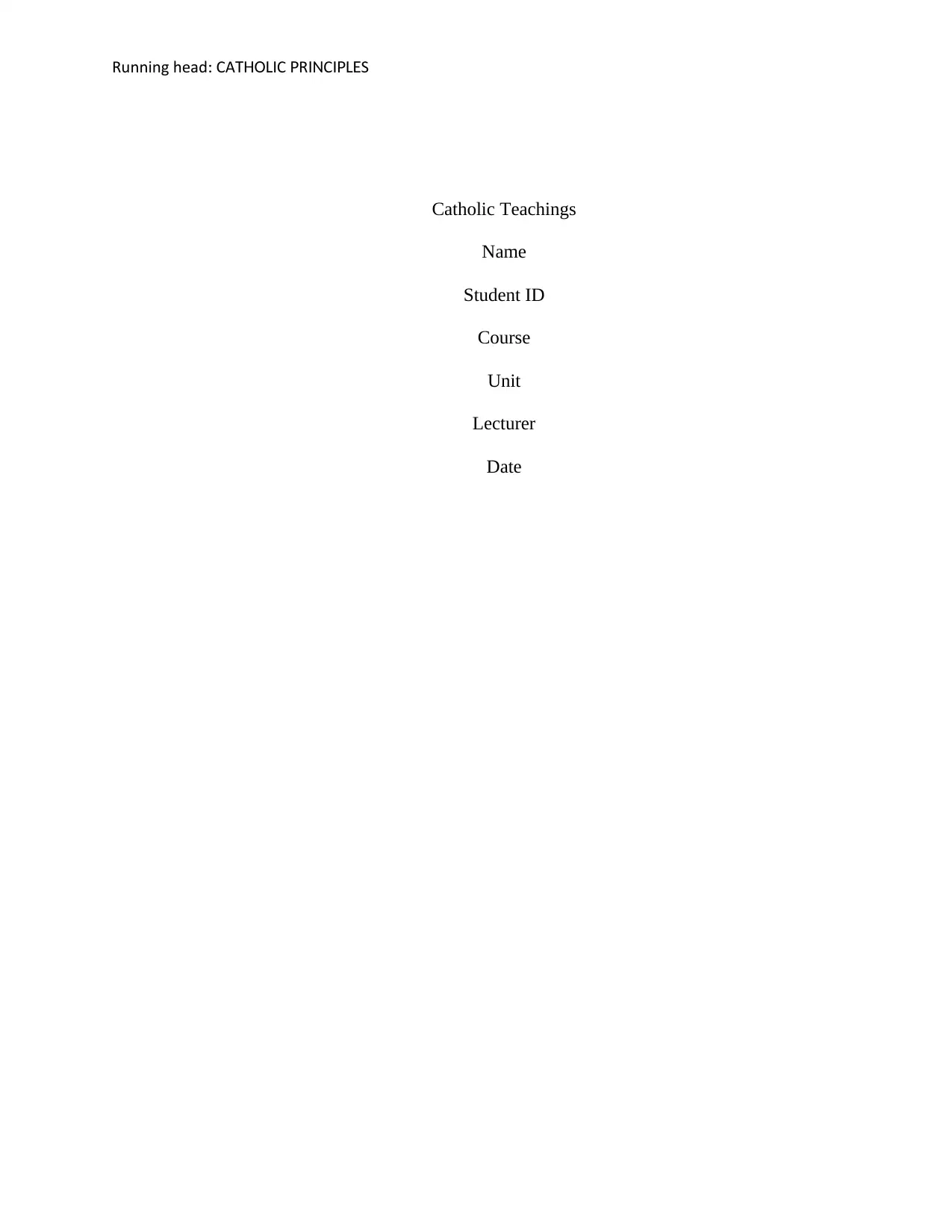
Running head CA C R C S: THOLI P IN IPLE
Catholic Teachings
Name
Student ID
Course
Unit
Lecturer
Date
Catholic Teachings
Name
Student ID
Course
Unit
Lecturer
Date
Paraphrase This Document
Need a fresh take? Get an instant paraphrase of this document with our AI Paraphraser
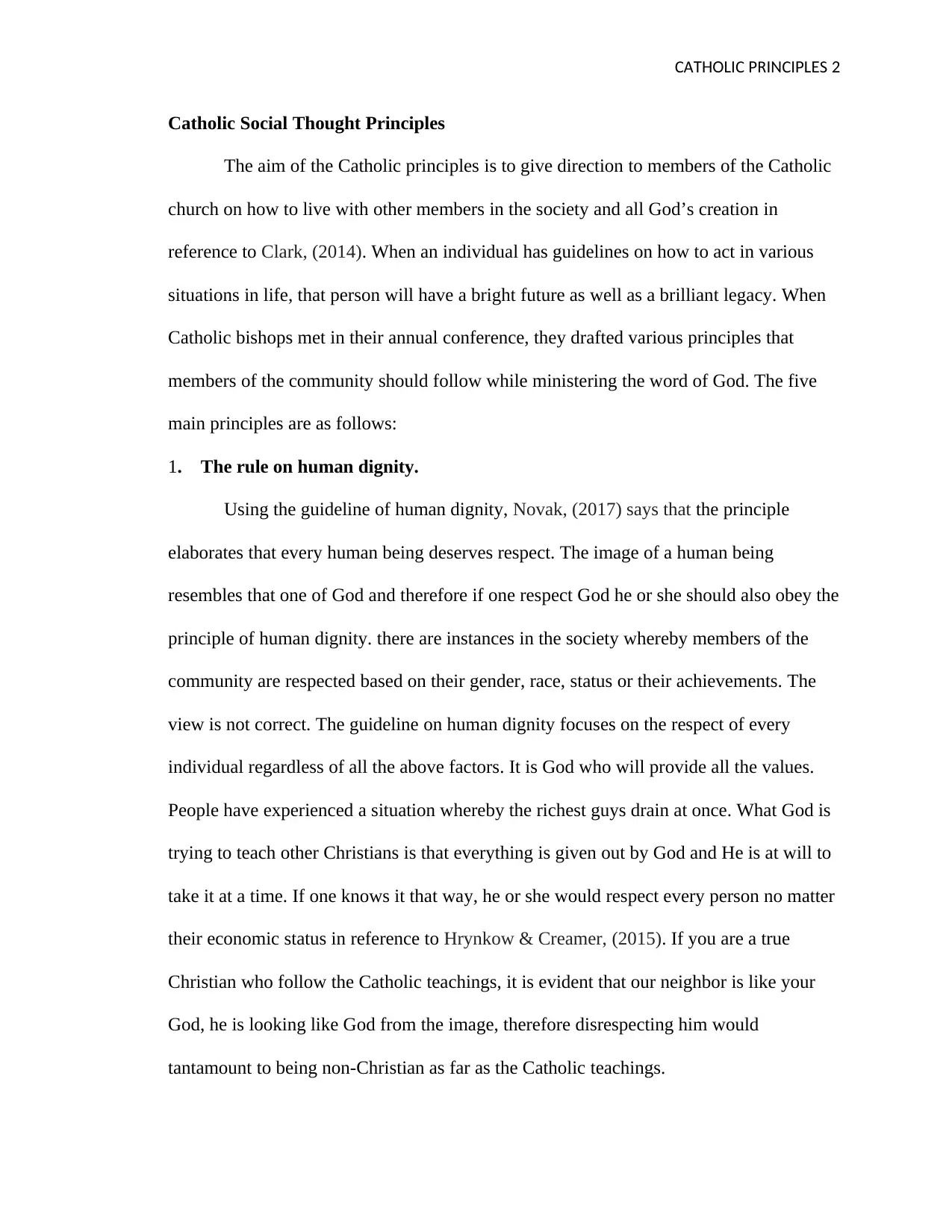
CA C R C STHOLI P IN IPLE 2
Catholic Social Thought Principles
The aim of the Catholic principles is to give direction to members of the Catholic
church on how to live with other members in the society and all God’s creation in
reference to Clark, (2014). When an individual has guidelines on how to act in various
situations in life, that person will have a bright future as well as a brilliant legacy. When
Catholic bishops met in their annual conference, they drafted various principles that
members of the community should follow while ministering the word of God. The five
main principles are as follows:
1. The rule on human dignity.
Using the guideline of human dignity, Novak, (2017) says that the principle
elaborates that every human being deserves respect. The image of a human being
resembles that one of God and therefore if one respect God he or she should also obey the
principle of human dignity. there are instances in the society whereby members of the
community are respected based on their gender, race, status or their achievements. The
view is not correct. The guideline on human dignity focuses on the respect of every
individual regardless of all the above factors. It is God who will provide all the values.
People have experienced a situation whereby the richest guys drain at once. What God is
trying to teach other Christians is that everything is given out by God and He is at will to
take it at a time. If one knows it that way, he or she would respect every person no matter
their economic status in reference to Hrynkow & Creamer, (2015). If you are a true
Christian who follow the Catholic teachings, it is evident that our neighbor is like your
God, he is looking like God from the image, therefore disrespecting him would
tantamount to being non-Christian as far as the Catholic teachings.
Catholic Social Thought Principles
The aim of the Catholic principles is to give direction to members of the Catholic
church on how to live with other members in the society and all God’s creation in
reference to Clark, (2014). When an individual has guidelines on how to act in various
situations in life, that person will have a bright future as well as a brilliant legacy. When
Catholic bishops met in their annual conference, they drafted various principles that
members of the community should follow while ministering the word of God. The five
main principles are as follows:
1. The rule on human dignity.
Using the guideline of human dignity, Novak, (2017) says that the principle
elaborates that every human being deserves respect. The image of a human being
resembles that one of God and therefore if one respect God he or she should also obey the
principle of human dignity. there are instances in the society whereby members of the
community are respected based on their gender, race, status or their achievements. The
view is not correct. The guideline on human dignity focuses on the respect of every
individual regardless of all the above factors. It is God who will provide all the values.
People have experienced a situation whereby the richest guys drain at once. What God is
trying to teach other Christians is that everything is given out by God and He is at will to
take it at a time. If one knows it that way, he or she would respect every person no matter
their economic status in reference to Hrynkow & Creamer, (2015). If you are a true
Christian who follow the Catholic teachings, it is evident that our neighbor is like your
God, he is looking like God from the image, therefore disrespecting him would
tantamount to being non-Christian as far as the Catholic teachings.
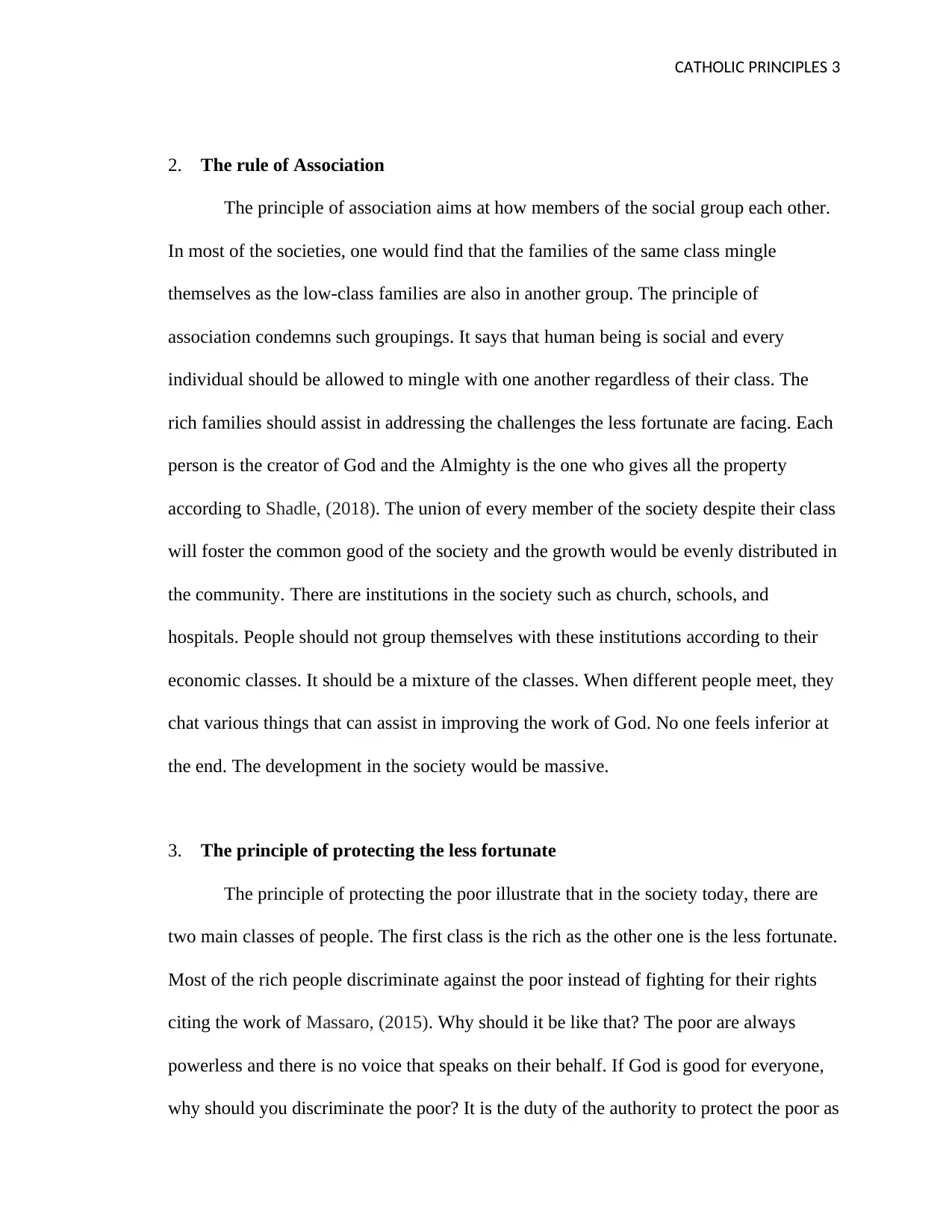
CA C R C STHOLI P IN IPLE 3
2. The rule of Association
The principle of association aims at how members of the social group each other.
In most of the societies, one would find that the families of the same class mingle
themselves as the low-class families are also in another group. The principle of
association condemns such groupings. It says that human being is social and every
individual should be allowed to mingle with one another regardless of their class. The
rich families should assist in addressing the challenges the less fortunate are facing. Each
person is the creator of God and the Almighty is the one who gives all the property
according to Shadle, (2018). The union of every member of the society despite their class
will foster the common good of the society and the growth would be evenly distributed in
the community. There are institutions in the society such as church, schools, and
hospitals. People should not group themselves with these institutions according to their
economic classes. It should be a mixture of the classes. When different people meet, they
chat various things that can assist in improving the work of God. No one feels inferior at
the end. The development in the society would be massive.
3. The principle of protecting the less fortunate
The principle of protecting the poor illustrate that in the society today, there are
two main classes of people. The first class is the rich as the other one is the less fortunate.
Most of the rich people discriminate against the poor instead of fighting for their rights
citing the work of Massaro, (2015). Why should it be like that? The poor are always
powerless and there is no voice that speaks on their behalf. If God is good for everyone,
why should you discriminate the poor? It is the duty of the authority to protect the poor as
2. The rule of Association
The principle of association aims at how members of the social group each other.
In most of the societies, one would find that the families of the same class mingle
themselves as the low-class families are also in another group. The principle of
association condemns such groupings. It says that human being is social and every
individual should be allowed to mingle with one another regardless of their class. The
rich families should assist in addressing the challenges the less fortunate are facing. Each
person is the creator of God and the Almighty is the one who gives all the property
according to Shadle, (2018). The union of every member of the society despite their class
will foster the common good of the society and the growth would be evenly distributed in
the community. There are institutions in the society such as church, schools, and
hospitals. People should not group themselves with these institutions according to their
economic classes. It should be a mixture of the classes. When different people meet, they
chat various things that can assist in improving the work of God. No one feels inferior at
the end. The development in the society would be massive.
3. The principle of protecting the less fortunate
The principle of protecting the poor illustrate that in the society today, there are
two main classes of people. The first class is the rich as the other one is the less fortunate.
Most of the rich people discriminate against the poor instead of fighting for their rights
citing the work of Massaro, (2015). Why should it be like that? The poor are always
powerless and there is no voice that speaks on their behalf. If God is good for everyone,
why should you discriminate the poor? It is the duty of the authority to protect the poor as
⊘ This is a preview!⊘
Do you want full access?
Subscribe today to unlock all pages.

Trusted by 1+ million students worldwide
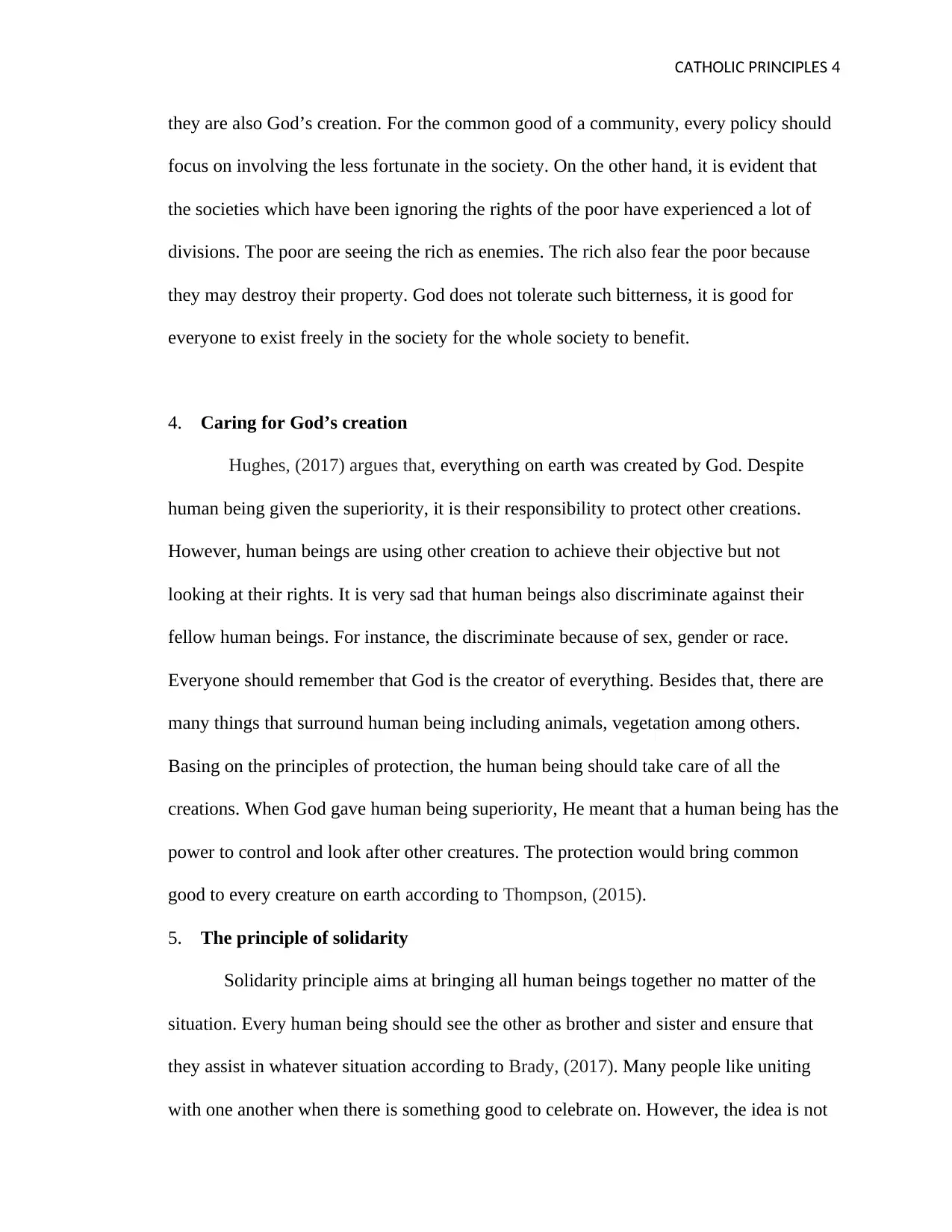
CA C R C STHOLI P IN IPLE 4
they are also God’s creation. For the common good of a community, every policy should
focus on involving the less fortunate in the society. On the other hand, it is evident that
the societies which have been ignoring the rights of the poor have experienced a lot of
divisions. The poor are seeing the rich as enemies. The rich also fear the poor because
they may destroy their property. God does not tolerate such bitterness, it is good for
everyone to exist freely in the society for the whole society to benefit.
4. Caring for God’s creation
Hughes, (2017) argues that, everything on earth was created by God. Despite
human being given the superiority, it is their responsibility to protect other creations.
However, human beings are using other creation to achieve their objective but not
looking at their rights. It is very sad that human beings also discriminate against their
fellow human beings. For instance, the discriminate because of sex, gender or race.
Everyone should remember that God is the creator of everything. Besides that, there are
many things that surround human being including animals, vegetation among others.
Basing on the principles of protection, the human being should take care of all the
creations. When God gave human being superiority, He meant that a human being has the
power to control and look after other creatures. The protection would bring common
good to every creature on earth according to Thompson, (2015).
5. The principle of solidarity
Solidarity principle aims at bringing all human beings together no matter of the
situation. Every human being should see the other as brother and sister and ensure that
they assist in whatever situation according to Brady, (2017). Many people like uniting
with one another when there is something good to celebrate on. However, the idea is not
they are also God’s creation. For the common good of a community, every policy should
focus on involving the less fortunate in the society. On the other hand, it is evident that
the societies which have been ignoring the rights of the poor have experienced a lot of
divisions. The poor are seeing the rich as enemies. The rich also fear the poor because
they may destroy their property. God does not tolerate such bitterness, it is good for
everyone to exist freely in the society for the whole society to benefit.
4. Caring for God’s creation
Hughes, (2017) argues that, everything on earth was created by God. Despite
human being given the superiority, it is their responsibility to protect other creations.
However, human beings are using other creation to achieve their objective but not
looking at their rights. It is very sad that human beings also discriminate against their
fellow human beings. For instance, the discriminate because of sex, gender or race.
Everyone should remember that God is the creator of everything. Besides that, there are
many things that surround human being including animals, vegetation among others.
Basing on the principles of protection, the human being should take care of all the
creations. When God gave human being superiority, He meant that a human being has the
power to control and look after other creatures. The protection would bring common
good to every creature on earth according to Thompson, (2015).
5. The principle of solidarity
Solidarity principle aims at bringing all human beings together no matter of the
situation. Every human being should see the other as brother and sister and ensure that
they assist in whatever situation according to Brady, (2017). Many people like uniting
with one another when there is something good to celebrate on. However, the idea is not
Paraphrase This Document
Need a fresh take? Get an instant paraphrase of this document with our AI Paraphraser
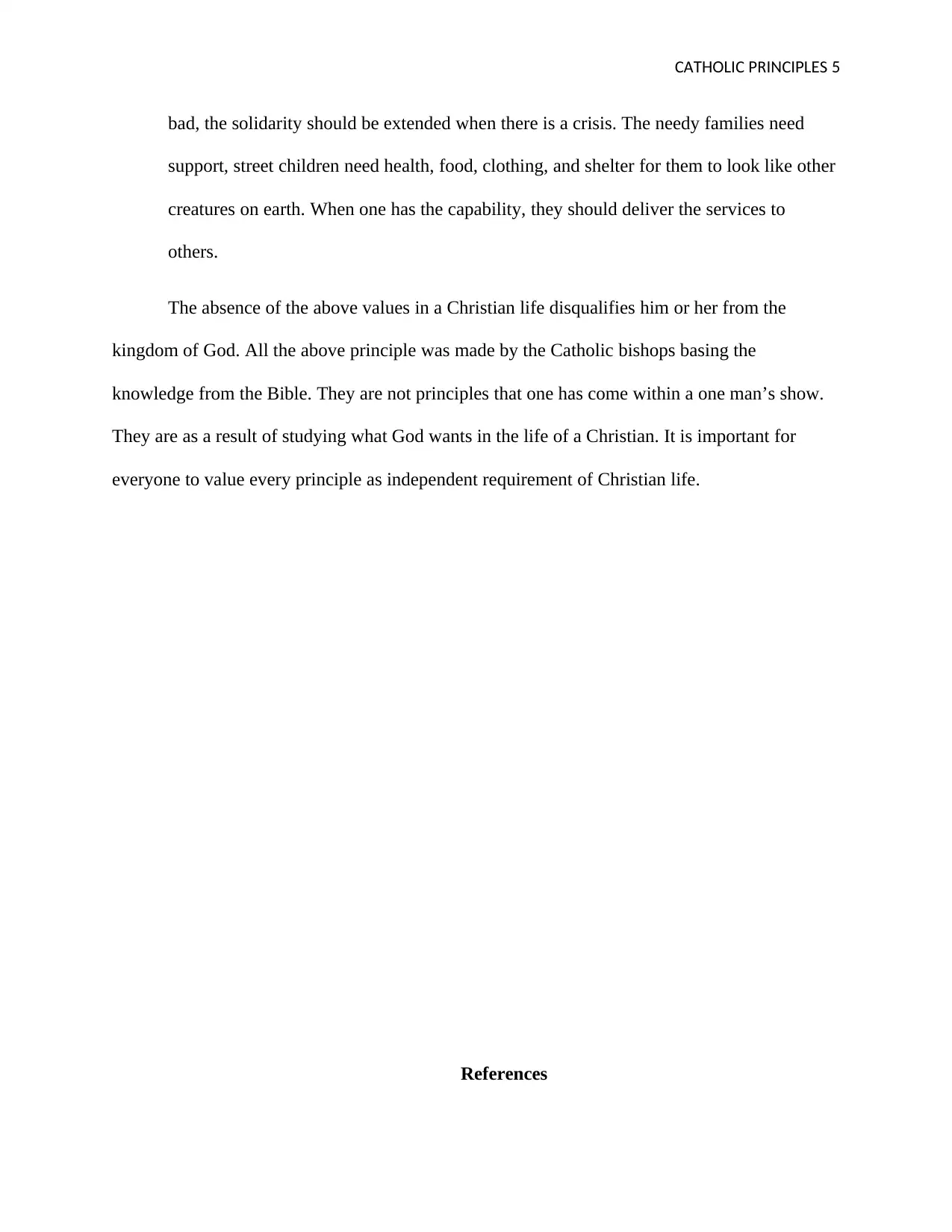
CA C R C STHOLI P IN IPLE 5
bad, the solidarity should be extended when there is a crisis. The needy families need
support, street children need health, food, clothing, and shelter for them to look like other
creatures on earth. When one has the capability, they should deliver the services to
others.
The absence of the above values in a Christian life disqualifies him or her from the
kingdom of God. All the above principle was made by the Catholic bishops basing the
knowledge from the Bible. They are not principles that one has come within a one man’s show.
They are as a result of studying what God wants in the life of a Christian. It is important for
everyone to value every principle as independent requirement of Christian life.
References
bad, the solidarity should be extended when there is a crisis. The needy families need
support, street children need health, food, clothing, and shelter for them to look like other
creatures on earth. When one has the capability, they should deliver the services to
others.
The absence of the above values in a Christian life disqualifies him or her from the
kingdom of God. All the above principle was made by the Catholic bishops basing the
knowledge from the Bible. They are not principles that one has come within a one man’s show.
They are as a result of studying what God wants in the life of a Christian. It is important for
everyone to value every principle as independent requirement of Christian life.
References
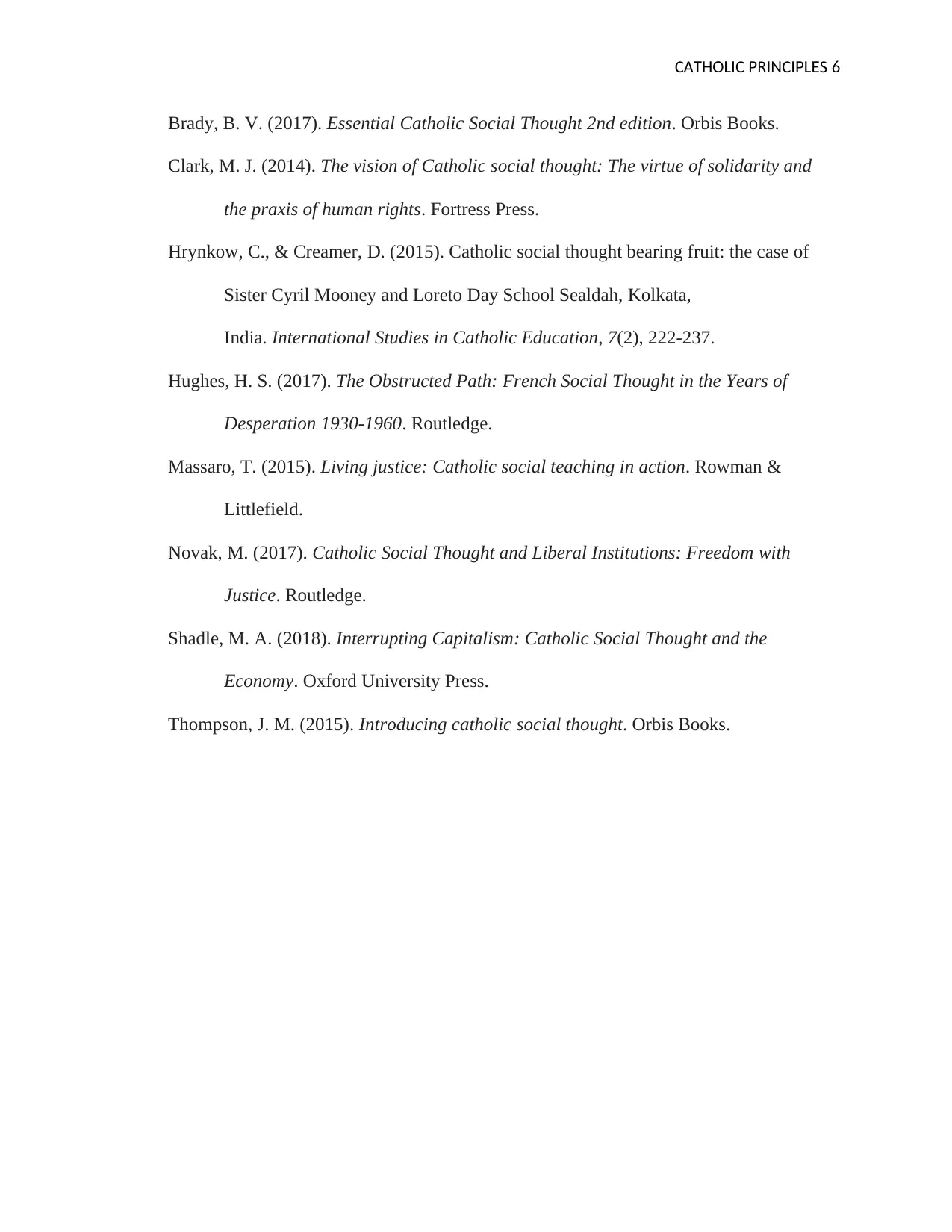
CA C R C STHOLI P IN IPLE 6
Brady, B. V. (2017). Essential Catholic Social Thought 2nd edition. Orbis Books.
Clark, M. J. (2014). The vision of Catholic social thought: The virtue of solidarity and
the praxis of human rights. Fortress Press.
Hrynkow, C., & Creamer, D. (2015). Catholic social thought bearing fruit: the case of
Sister Cyril Mooney and Loreto Day School Sealdah, Kolkata,
India. International Studies in Catholic Education, 7(2), 222-237.
Hughes, H. S. (2017). The Obstructed Path: French Social Thought in the Years of
Desperation 1930-1960. Routledge.
Massaro, T. (2015). Living justice: Catholic social teaching in action. Rowman &
Littlefield.
Novak, M. (2017). Catholic Social Thought and Liberal Institutions: Freedom with
Justice. Routledge.
Shadle, M. A. (2018). Interrupting Capitalism: Catholic Social Thought and the
Economy. Oxford University Press.
Thompson, J. M. (2015). Introducing catholic social thought. Orbis Books.
Brady, B. V. (2017). Essential Catholic Social Thought 2nd edition. Orbis Books.
Clark, M. J. (2014). The vision of Catholic social thought: The virtue of solidarity and
the praxis of human rights. Fortress Press.
Hrynkow, C., & Creamer, D. (2015). Catholic social thought bearing fruit: the case of
Sister Cyril Mooney and Loreto Day School Sealdah, Kolkata,
India. International Studies in Catholic Education, 7(2), 222-237.
Hughes, H. S. (2017). The Obstructed Path: French Social Thought in the Years of
Desperation 1930-1960. Routledge.
Massaro, T. (2015). Living justice: Catholic social teaching in action. Rowman &
Littlefield.
Novak, M. (2017). Catholic Social Thought and Liberal Institutions: Freedom with
Justice. Routledge.
Shadle, M. A. (2018). Interrupting Capitalism: Catholic Social Thought and the
Economy. Oxford University Press.
Thompson, J. M. (2015). Introducing catholic social thought. Orbis Books.
⊘ This is a preview!⊘
Do you want full access?
Subscribe today to unlock all pages.

Trusted by 1+ million students worldwide
1 out of 6
Related Documents
Your All-in-One AI-Powered Toolkit for Academic Success.
+13062052269
info@desklib.com
Available 24*7 on WhatsApp / Email
![[object Object]](/_next/static/media/star-bottom.7253800d.svg)
Unlock your academic potential
Copyright © 2020–2026 A2Z Services. All Rights Reserved. Developed and managed by ZUCOL.





